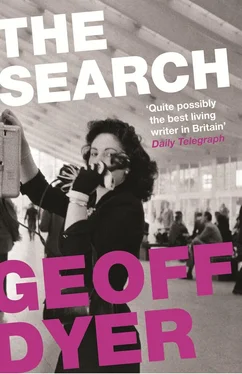Geoff Dyer - The Search
Здесь есть возможность читать онлайн «Geoff Dyer - The Search» весь текст электронной книги совершенно бесплатно (целиком полную версию без сокращений). В некоторых случаях можно слушать аудио, скачать через торрент в формате fb2 и присутствует краткое содержание. Год выпуска: 2013, Издательство: Canongate Books, Жанр: Современная проза, на английском языке. Описание произведения, (предисловие) а так же отзывы посетителей доступны на портале библиотеки ЛибКат.
- Название:The Search
- Автор:
- Издательство:Canongate Books
- Жанр:
- Год:2013
- ISBN:нет данных
- Рейтинг книги:3 / 5. Голосов: 1
-
Избранное:Добавить в избранное
- Отзывы:
-
Ваша оценка:
- 60
- 1
- 2
- 3
- 4
- 5
The Search: краткое содержание, описание и аннотация
Предлагаем к чтению аннотацию, описание, краткое содержание или предисловие (зависит от того, что написал сам автор книги «The Search»). Если вы не нашли необходимую информацию о книге — напишите в комментариях, мы постараемся отыскать её.
The Search — читать онлайн бесплатно полную книгу (весь текст) целиком
Ниже представлен текст книги, разбитый по страницам. Система сохранения места последней прочитанной страницы, позволяет с удобством читать онлайн бесплатно книгу «The Search», без необходимости каждый раз заново искать на чём Вы остановились. Поставьте закладку, и сможете в любой момент перейти на страницу, на которой закончили чтение.
Интервал:
Закладка:
Eventually he heard the bus rumble into town, a slow curl of dust in its wake. Four people got off. He was the only person waiting to board. The driver looked at him with surprise when he asked for a ticket to wherever the bus was going.
‘That’ll be Bad Axe.’
‘Bad Axe is perfect.’
Walker made his way to the back of the bus. There were few other passengers — a couple with rucksacks, an old Mexican woman, a man with a cane. He stretched out in the back seat, sun slanting in through one of the side windows. He wanted to sleep but wanted also to savour this view of the city which so few had shared. Most buildings were flat and pale brown, enlivened only by the neon signs of shops that paled in the gathering sunlight. He was struck by the sprawling extent of the town, by the number of homes that each year encroached a little further into the desert. He found it hard to believe that he had been there — how long? It hardly mattered — however long he had been there he was lucky it was coming to an end. Everything came down to luck. The search was a matter of luck, a test of luck — and luck was a test of character. You could gauge yourself by the quality of your luck. Luck was everything. He breathed a sigh of relief as the bus pulled past a half-built office block, a fence that would never be creosoted.
CHAPTER TWELVE
Walker shaved and cleaned his teeth in the station washrooms at Bad Axe. He felt sluggish but the lassitude that had overwhelmed him in Despond had evaporated and he was thinking once again about the search, anxious to make up for the time he had wasted. In the information office the word Horizon came into his mind — out of nowhere, for no reason. Spores were blown around by the wind and plants sprang up where they happened to settle. Maybe words and ideas were a kind of spore: they were in the air and sometimes they settled on you. Feeling foolish he asked the woman at the desk if there was a place called Horizon nearby.
‘A bus leaves in twenty minutes,’ she said, unstartled, un-smiling.
As he paid for the ticket he told himself this decision was based on a hunch, on intuition, but he knew this was not true. Intuition suggested an instinctive version of thought, but really he was proceeding by impulse, by whim, impatient to get moving again.
When he arrived there he thought it was not a city but one building in the city. Then, as he began to get a sense of the scale of the place, he realized that although there were no roads or streets, corridors and hallways served as thoroughfares, vast ballrooms as parks, rooms as houses. Here and there he found windows but all he could see from them, except for the damp courtyard many yards below, were the walls and windows of the rest of the building, the rest of the city. He opened doors which led to more rooms. Sometimes these were huge with high ceilings, empty except for a dark table, chairs, chandeliers. Other rooms were small with armchairs and a fireplace. A few were carpeted but most had floors of polished wood that clanged and echoed underfoot. When he stopped walking he heard other footsteps but, in the vast interiors and winding corridors, he wondered if these were the echoes of his own steps. He walked into a room with a great gilt-edged mirror, enormous as a painting of a battle or biblical scene. The mirror made the room unfathomably huge, empty of everything except its own reflected image and his tiny figure in one corner. From there he moved into a room with an oil painting over the fireplace. It showed a vast room, not dissimilar to many of those he had passed through. As he walked on through the city he saw more paintings, always of interiors. Whenever he came across a painting he hoped it might be a landscape but there was never a hint of the outdoors. He resisted any feeling of panic but gradually the sense of being trapped by the vastness of his surroundings began to alarm him. Generally, you were either lost in a wilderness — a desert or an ocean — or trapped in a confined space — a dungeon. Here Walker was simultaneously trapped in a dungeon and lost in the vastness of his confines. It would have been possible to climb out of a window and down one of the thin drain-pipes that clung to the walls like rope but there was no point — they led only to the courtyard that was like an open-air dungeon. Leaning out of some windows and craning upwards he could see a colourless patch of sky but most did not afford even this prospect. Instead they simply opened on to another room. He could go where he pleased but wherever he went he came to more rooms. Like this one, empty except for a long conference table and thin black chairs. On the table was a decanter of red wine, glasses. The austerity and scale of the room made him feel like he had come for a meeting with an all-powerful bureaucrat. He poured a glass of wine, the slight tinkling of the glass magnified many times over by the acoustic vastness. Held the glass up to the light and watched the red liquid flare like a volcano erupting under the sea. He pulled a chair out and sipped the wine. It was inconceivable that a city like this — or building or whatever this place was — could go on for much longer. Even assuming it was the size of London he could still cross it in. . how long? A couple of days? That was two days without food — there was water and wine, but so far he had seen nothing to eat — yet the prospect was daunting rather than frightening. The only thing to do was keep walking. On impulse, as he was leaving, he picked up the decanter of wine and hurled it at a wall. Knowing he could trash the place was somehow reassuring and a few moments later he carved his initials in a big oak table. Then, for no reason, he added FUCK OFF in jagged ugly letters. This act of childish vandalism cheered him up considerably and he walked out of the room with his hands in his pockets, smiling. Soon he felt sleepy from the wine and lay down on an embroidered sofa. It was difficult to sleep with nothing to cover him, so he yanked down one of the curtains and curled up beneath it.
He had no idea how long he slept. When he woke the window was dark as a blackboard but apart from that nothing had changed. Even so, the fact that it was night outside made him feel even more trapped in the city. He got up and resumed his journey through the rooms and stairs and corridors. In a large ante-room — the term made no sense, every room here was an ante-room — he found what appeared to be a visitors’ book. It was half-full of names and signatures, the last of which was Malory’s. He added his own and walked on.
He left Horizon as abruptly as he had arrived. He opened a door — identical to hundreds of others which he had opened during his stay in the city — and there, stretching ahead, was a road sloping into the distance.
He closed the door behind him and walked on, enjoying the empty air and the wind combing the roadside trees. After half an hour he came to a railway station. The train was about to leave and he made it with seconds to spare: as soon as he slammed the door behind him he heard a whistle and the train moved out.
He found an empty compartment but at the next station the door slid open and a tall man — thin, mid-thirties, hair clipped army-short at the back and sides — sat down opposite him. As soon as he had settled himself he put on a pair of tortoise-shell glasses and began reading: Tom Jones , a book Walker had half read so long ago he had forgotten almost everything about it — Tom was searching for his lost brother or mother or sweetheart. In any case, whoever he was looking for was really just an excuse to propel him on his adventures.
Seeing the man absorbed in his novel like that made Walker aware that he no longer read books. He noticed posters, tickets, words on scraps of paper, odd things scribbled in bus shelters or in the margins of timetables, signs glimpsed from the window of the train, but it never occurred to him to read a book. Noticing Walker looking at the book in his hand the guy smiled and said, ‘Have you read it?’
Читать дальшеИнтервал:
Закладка:
Похожие книги на «The Search»
Представляем Вашему вниманию похожие книги на «The Search» списком для выбора. Мы отобрали схожую по названию и смыслу литературу в надежде предоставить читателям больше вариантов отыскать новые, интересные, ещё непрочитанные произведения.
Обсуждение, отзывы о книге «The Search» и просто собственные мнения читателей. Оставьте ваши комментарии, напишите, что Вы думаете о произведении, его смысле или главных героях. Укажите что конкретно понравилось, а что нет, и почему Вы так считаете.












